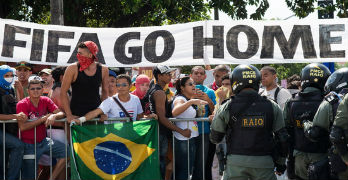
With less than a month until the start of one of the most anticipated sporting events in the world in 2014, the 21st century’s first Brazilian World Cup, there have been serious concerns about whether or not the arenas in which the games are supposed to be held will be ready on June 12, the day the games are supposed to start.
With the tournament’s first kickoff around the corner, Brazil remains plagued by trouble that surfaced last year amid massive protests around the country led by the masses of discontented citizens who live in the country’s world famous shanty towns, the favelas, that dominate large portions of major cities. Large numbers of Brazil’s lower income population lives in the urban favelas and they have been at the front lines of the recent marches protesting the huge amount of public money being spent on the World Cup by federal and local governments.
 These protest have coincided with a worsening of the Brazilian economy. At the time in 2007 when Brazil was awarded the world cup, the country’s GDP was growing at 5% annually and was helping to lift millions out of poverty. Since that time, the country once know as the ‘B’ in the world’s ascendent BRIC nations (Brazil, Russia, India, China) has slowed its growth to just 2.3% last year compared to 7.5% in China.
These protest have coincided with a worsening of the Brazilian economy. At the time in 2007 when Brazil was awarded the world cup, the country’s GDP was growing at 5% annually and was helping to lift millions out of poverty. Since that time, the country once know as the ‘B’ in the world’s ascendent BRIC nations (Brazil, Russia, India, China) has slowed its growth to just 2.3% last year compared to 7.5% in China.
At the same time, despite football being the country’s most popular sport and a national pride, recent polling has shown that support for the country holding the tournament has fallen from its high of eighty percent in 2008 (from one year after the awarding of the tournament) to less than half of the population approving now.
Among the demands of protesters: the government pay more attention to Brazil’s poor and vulnerable instead of spending money on useless World Cup infrastructure and arena sites. Demands that the government spend more money on healthcare and education are prevalent at protests.
In addition to the social problems, that have been in the spotlight there have also been concerns about the construction of the 12 arena venues throughout Brazil. According to a report done by the BBC, two stadium sites in Sao Paulo and Porto Algere are still not finished with only a month to go before they are to be used. Along with the unfinished construction, there have been three deaths contributed to construction related accidents with the latest accident occurring when a construction worker fell to his death in late March at the Sao Paulo arena site.
The estimated cost of construction for all 12 stadium sites is estimated to total out at $218 million when all the stadium sites are completed. The cost of the persistent corruption and mismanagement that have plagued the country however, is still to be tabulated.
Leave a Reply